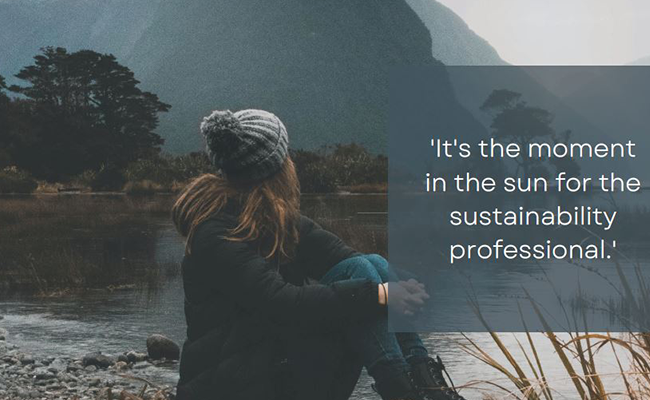 University of Otago Master of Sustainable Business student Gabi Rutherford-Carr works in the University's Sustainability Office
University of Otago Master of Sustainable Business student Gabi Rutherford-Carr works in the University's Sustainability Office
The time is right to become a sustainability professional in New Zealand – they are in short supply along with the technical skills increasingly needed for carbon foot-printing, climate change science, and finance, new research shows.
Roles are appearing more in executive suites for Chief Sustainability Officers, financial sustainability, and cultural competency, University of Otago Master of Sustainable Business student Gabi Rutherford-Carr says.
New Zealand has one of the highest concentrations of sustainability professionals globally and jobs even rose during last year's pandemic, so understanding the role has never been more important. But research in this country is limited.
Rutherford-Carr – who works in the University's Sustainability Office – interviewed 10 sustainability professionals from diverse sectors for her project about the profession in New Zealand.
Master of Sustainable Business co-director Associate Professor Sara Walton says doing the course set up Miss Rutherford-Carr for the job at the University and the master is also upskilling existing professionals to meet the market's recognised needs.
Students have a wide variety of experience, backgrounds, and ages because sustainability knowledge “is becoming so necessary to organisations now”.
While the master has traditionally been on campus, a distance-learning option was added this year, Associate Professor Walton says.
Technical skills
Rutherford-Carr's research shows existing professionals believe sustainability will soon be a part of everyone's job as New Zealand targets decarbonisation so businesses need to support all staff to develop those capabilities and imbed sustainability in their company's DNA.
The research also recommends existing sustainability professionals do micro-credentialling to gain certifications and other short, targeted courses to keep up with rapidly changing technical roles, which are driven by frequent new standards, regulations, and methods.
Many new decarbonisation positions need technical skills to fulfil the Labour government's commitment to reaching net carbon zero by 2050.
Existing sustainability professionals feel even a new government will not slow those efforts because of pressure from Generation Z's focus on sustainability and the international focus on lowering carbon emissions, Rutherford-Carr says.

Personal skills
Her research found soft skills are fundamental for sustainability professionals – including communication, relationship-building, and behavioural analysis – because existing practitioners see their roles as sense-makers, change-agents, chief hustlers, and internal activists.
They face “the difficult challenge of transforming the world as we know it, to change behaviours, the way we conduct business, and the systems … we operate in,” Rutherford-Carr says.
The professionals emphasise the importance of connecting, listening, and creating positive, trusting relationships if New Zealand is serious about generating change.
Communication is particularly important because climate delayers' resistance is a big challenge in this country, partly because New Zealand is so isolated from others' climate disasters.
Early career sustainability professionals particularly need personal skills like passion, resilience, and optimism. Strong mentorship is also vital to keep morale high because daunting climate change issues – including mass deaths and biodiversity loss – can be exhausting.
Existing professionals find most comfort in sustainability peers who share their concerns and values, she says.
Unique skills
Because Māori culture is unique to Aotearoa, sustainability professionals also need an understanding of te ao Māori (the Māori world view), which is naturally interconnected with sustainability, and the founding document Te Tiriti o Waitangi.
Existing professionals want to develop those skills but more work is needed to help both them and businesses understand their treaty partnership responsibilities in business terms and how to keep allyship top-of-mind in decision making, Rutherford-Carr says.
Another unique Aotearoa factor is the 'two degrees of separation' – having very few people between sustainability professionals and the people in power – which creates opportunities to initiate change faster than more populated countries, she says.
Educational institutions
Learning institutions can support sustainability by integrating it into all their courses while building students' technical skills through practical learning assessments, such carbon-foot printing, risk and opportunity assessments, and scenario analysis.
Students should use these skills to help local businesses, to get the practical sustainability experience that is in short supply, she says.
Micro-credentials would also help meet the workforce's needs and could include carbon foot printing, life cycle assessments, and climate related risk and opportunities assessments.
To combat students' growing anxiety about climate change, educational institutions should build students' resilience as well, by widening discussions about problems to include potential solutions.
The institutions should also build students' cultural confidence, including their understanding Te Tiriti o Waitangi in a business context and Te ao Māori, Rutherford-Carr says.
- Kōrero by Gail Goodger
